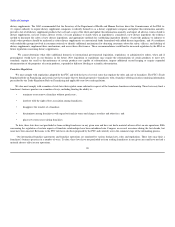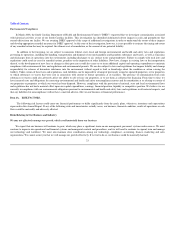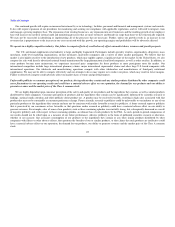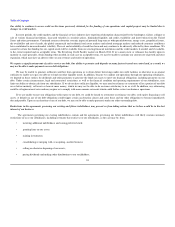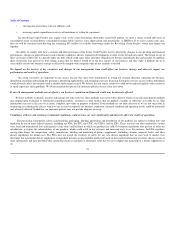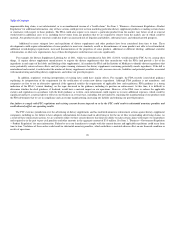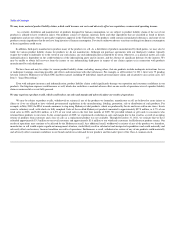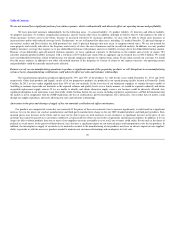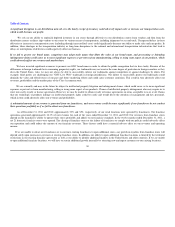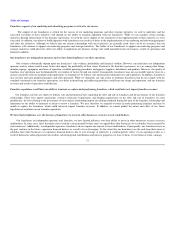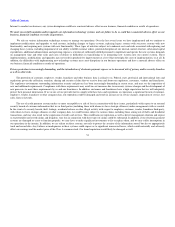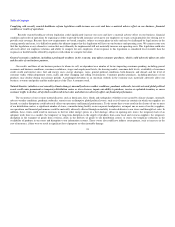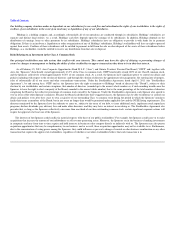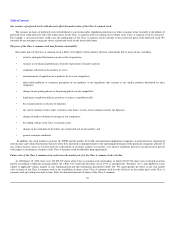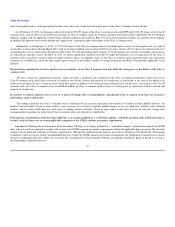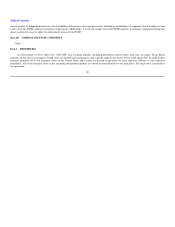GNC 2012 Annual Report Download - page 32
Download and view the complete annual report
Please find page 32 of the 2012 GNC annual report below. You can navigate through the pages in the report by either clicking on the pages listed below, or by using the keyword search tool below to find specific information within the annual report.
Table of Contents
A significant disruption to our distribution network or to the timely receipt of inventory could adversely impact sales or increase our transportation costs,
which would decrease our profits.
We rely on our ability to replenish depleted inventory in our stores through deliveries to our distribution centers from vendors and then from the
distribution centers or direct ship vendors to our stores by various means of transportation, including shipments by sea and truck. Unexpected delays in those
deliveries or increases in transportation costs (including through increased fuel costs) could significantly decrease our ability to make sales and earn profits. In
addition, labor shortages in the transportation industry or long-term disruptions to the national and international transportation infrastructure that lead to
delays or interruptions of deliveries could negatively affect our business.
If we fail to protect our brand name, competitors may adopt trade names that dilute the value of our brand name, and prosecuting or defending
infringement claims could cause us to incur significant expenses or prevent us from manufacturing, selling or using some aspect of our products, which
could adversely affect our revenues and market share.
We have invested significant resources to promote our GNC brand name in order to obtain the public recognition that we have today. Because of the
differences in foreign trademark laws concerning proprietary rights, our trademarks may not receive the same degree of protection in foreign countries as they
do in the United States. Also, we may not always be able to successfully enforce our trademarks against competitors or against challenges by others. For
example, third parties are challenging our "GNC Live Well" trademark in foreign jurisdictions. Our failure to successfully protect our trademarks could
diminish the value and effectiveness of our past and future marketing efforts and could cause customer confusion. This could in turn adversely affect our
revenues, profitability and the market price of the Class A common stock.
We are currently and may in the future be subject to intellectual property litigation and infringement claims, which could cause us to incur significant
expenses or prevent us from manufacturing, selling or using some aspect of our products. Claims of intellectual property infringement also may require us to
enter into costly royalty or license agreements. However, we may be unable to obtain royalty or license agreements on terms acceptable to us or at all. Claims
that our technology or products infringe on intellectual property rights could be costly and would divert the attention of management and key personnel,
which in turn could adversely affect our revenues and profitability.
A substantial amount of our revenue is generated from our franchisees, and our revenues could decrease significantly if our franchisees do not conduct
their operations profitably or if we fail to attract new franchisees.
As of December 31, 2011 and 2010, approximately 33% and 32%, respectively, of our retail locations were operated by franchisees. Our franchise
operations generated approximately 16.1% of our revenues for each of the years ended December 31, 2011 and 2010. Our revenues from franchise stores
depend on the franchisees' ability to operate their stores profitably and adhere to our franchise standards. In the twelve months ended December 31, 2011, a
net 21 domestic franchise stores were opened. The closing of franchise stores or the failure of franchisees to comply with our policies could adversely affect
our reputation and could reduce the amount of our franchise revenues. These factors could have a material adverse effect on our revenues and operating
income.
If we are unable to attract new franchisees or to convince existing franchisees to open additional stores, any growth in royalties from franchise stores will
depend solely upon increases in revenues at existing franchise stores. In addition, our ability to open additional franchise locations is limited by the territorial
restrictions in our existing franchise agreements as well as our ability to identify additional markets in the United States and other countries. If we are unable
to open additional franchise locations, we will have to sustain additional growth internally by attracting new and repeat customers to our existing locations.
30


